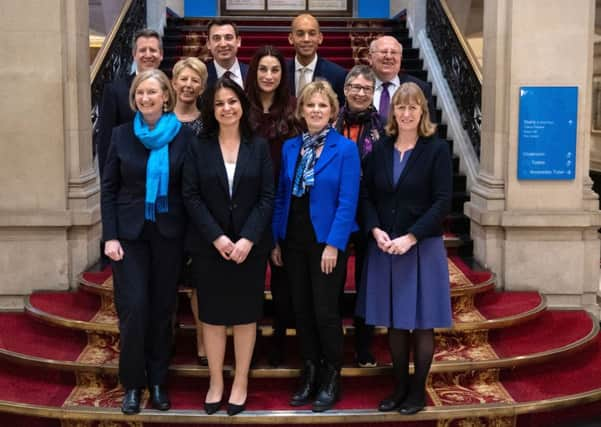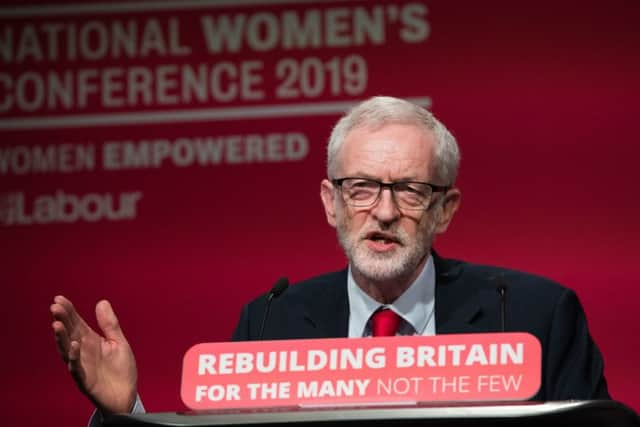Andrew Vine: Time to reclaim centre ground in British politics


At last, there seems to be a glimmer of hope that sensible, centre-ground politics can make a comeback and the extreme views that have gripped both the major parties can be banished to the outer edges where they belong.
Advertisement
Hide AdAdvertisement
Hide AdLike most voters, I’m uncomfortable with zealotry. Our country’s instinct is for consensus and compromise, and recent governments have reflected that.


The centre-right politics of John Major and David Cameron, or the centre-left of Tony Blair and Gordon Brown, had broad appeal that saw voters switch back and forth between Labour and Conservatives because moderate policies reflected their own views.
The ultimate expression of that instinct for the centre ground and co-operation was the coalition between the Conservatives and Liberal Democrats, in retrospect a period of stability in which Britain faced up to serious challenges with maturity and resolve. But all that has gone. The angst of the country over where Brexit will lead, and the divisions that have grown so bitter between advocates of leaving the EU or remaining, have been aggravated by the takeover of the parties by their hardliners.
That has left a gaping hole in our politics and robbed a silent majority of voters of a party they can comfortably support. It has also undermined trust in both parties’ ability to govern.
Advertisement
Hide AdAdvertisement
Hide AdWe’re in danger of seeing a perfect storm that could see the country suffering the economic aftershocks of a disorderly Brexit at the same time as a collapse in confidence in the political class whose job it will be to provide leadership.
The reasons cited by the MPs who have resigned echo the concerns of the electorate about the parties. For Labour in particular, they have been damning. That a great social and political force for good is now condemned by its own as anti-Semitic is utterly shameful and an indictment of its direction under Jeremy Corbyn’s leadership.
Hardly less damning is the contention of departing MPs that he is unfit to be Prime Minister and would represent a threat to Britain’s security if elected. But should anybody be surprised? He is an unreconstructed revolutionary Socialist, the product of an age of militant left-wing thinking that should have remained on the fringes to which it was forced in the battles for the soul of Labour in the 1980s.
The growing unease is shown by the drop in Labour membership after the initial surge of enthusiasm for Mr Corbyn. It has only been reinforced by the lacerating, yet dignified, statements by such sensible and moderate figures as Luciana Berger and Chris Leslie, the former MP for Shipley.
Advertisement
Hide AdAdvertisement
Hide AdYet the Conservatives have no room to crow at Labour’s discomfort. For the Prime Minister to acknowledge, as she did last week, that local associations are being infiltrated by hardline Ukip supporters intent on deselecting MPs who are not ardent Brexiteers is an astonishing state of affairs.
Hardly less worrying for those to whom the Tories are the natural party of government is its takeover by the zealots of the right-wing European Research Group. This bunch are so far adrift of mainstream public opinion that it is hard to believe they have effectively held the Government to ransom with their damn-the-consequences advocacy of a no-deal Brexit.
Their readiness to exploit the weakness of their own party leader, and potentially plunge Britain into economic chaos, makes them no better than the most fanatical disciple of Mr Corbyn.
There was a pressing need for the emergence of a centrist group as a counterbalance to the extremes of right and left. Their instinct that our two-party system is broken, leaving voters with nowhere to turn whenever the next General Election comes is spot-on.
Advertisement
Hide AdAdvertisement
Hide AdWhat they have done is not without risk to their own futures. The members of The Independent Group may have condemned themselves to electoral oblivion and could go the way of the SDP in the 1980s when it attempted to break the two-party stranglehold. Or their emergence may herald a new dawn, the mechanism by which the electorate declares itself sick of zealotry and votes for a return to mainstream policies.
But even if they fail at the ballot box as a grouping, their presence should be the catalyst for both Conservative and Labour moderates to rise up against the extremes of their parties, take control and drag policy back to the centre ground.
And if that is all this courageous, independent-minded group of MPs achieve, they will have done their country a service.